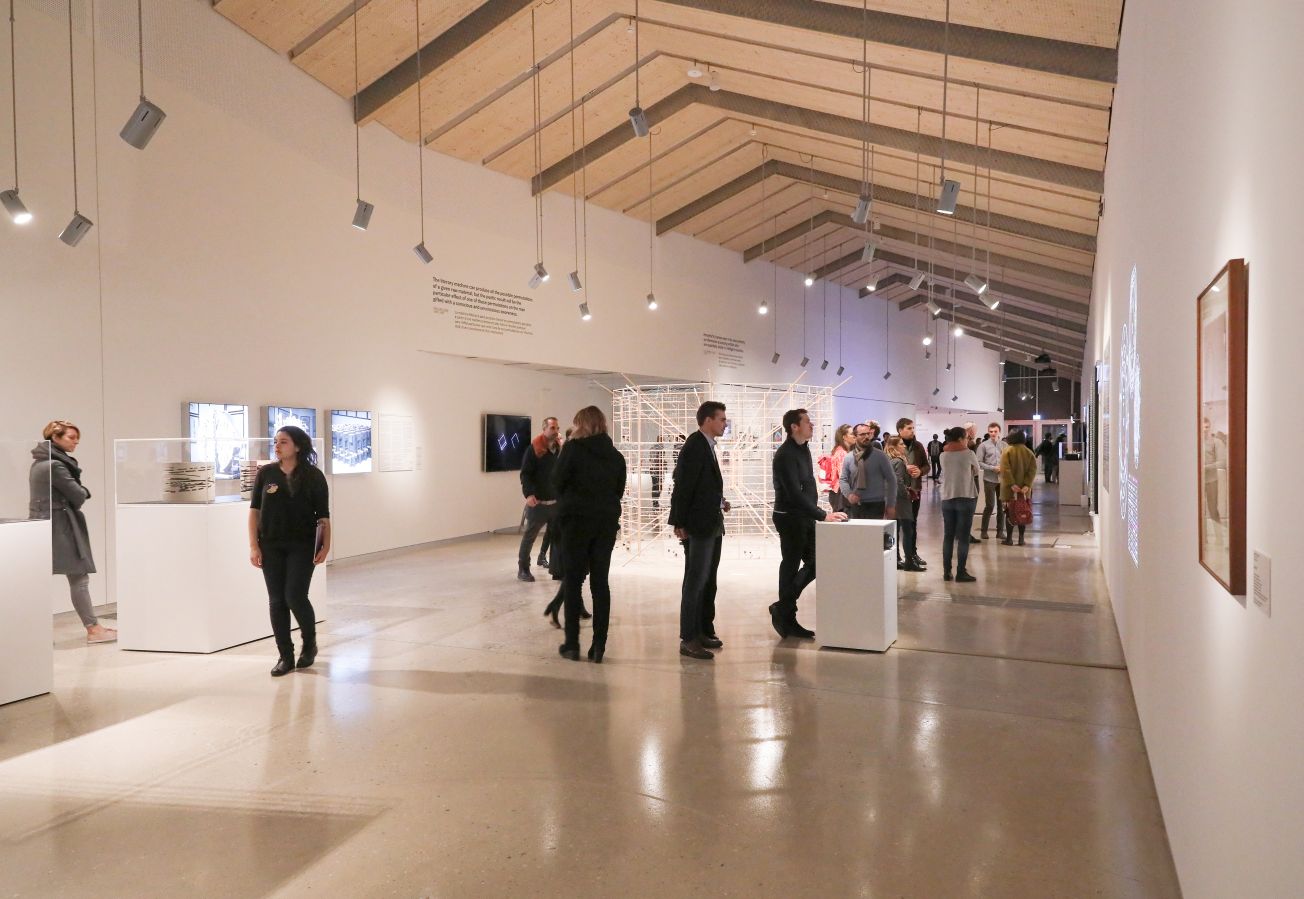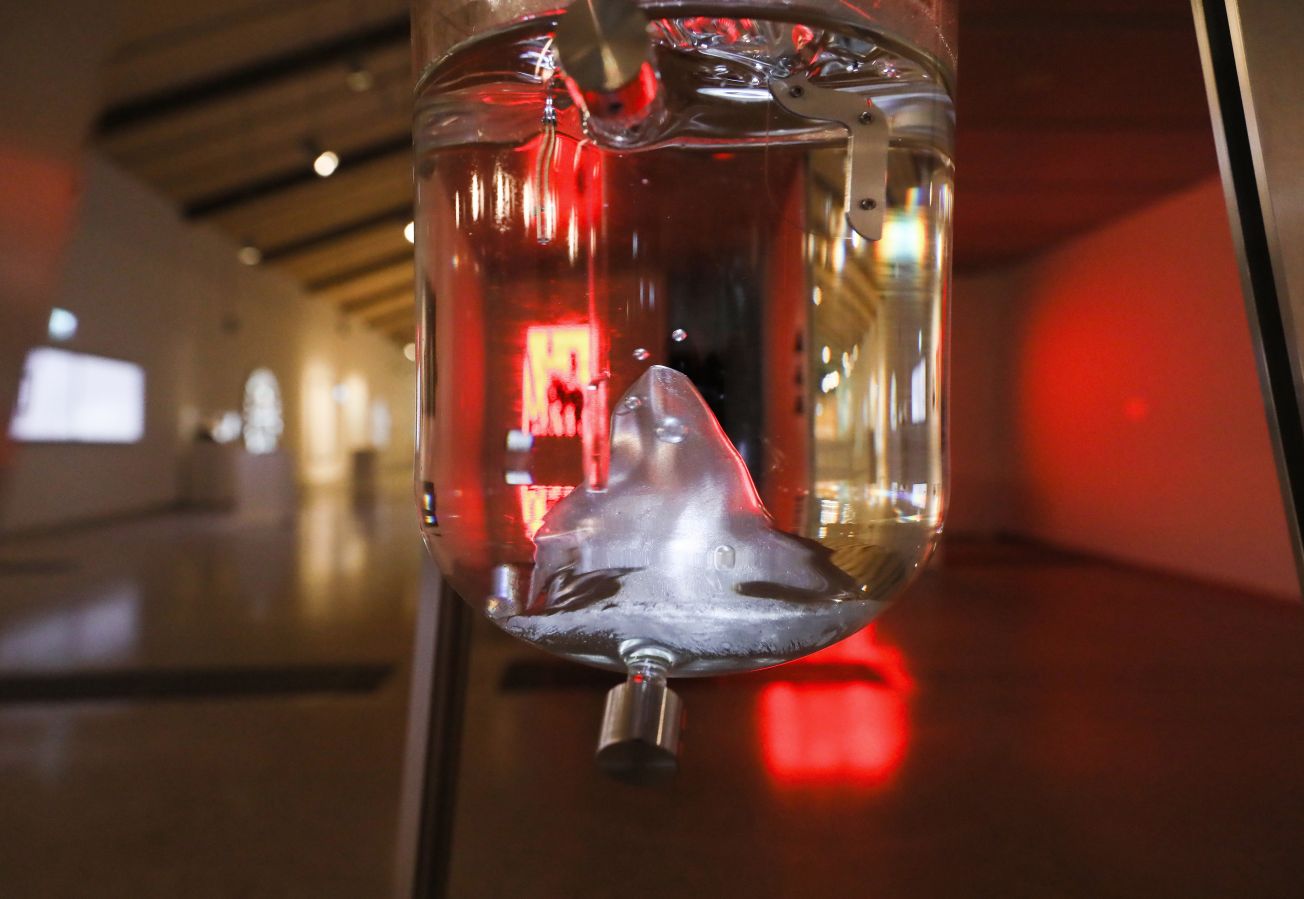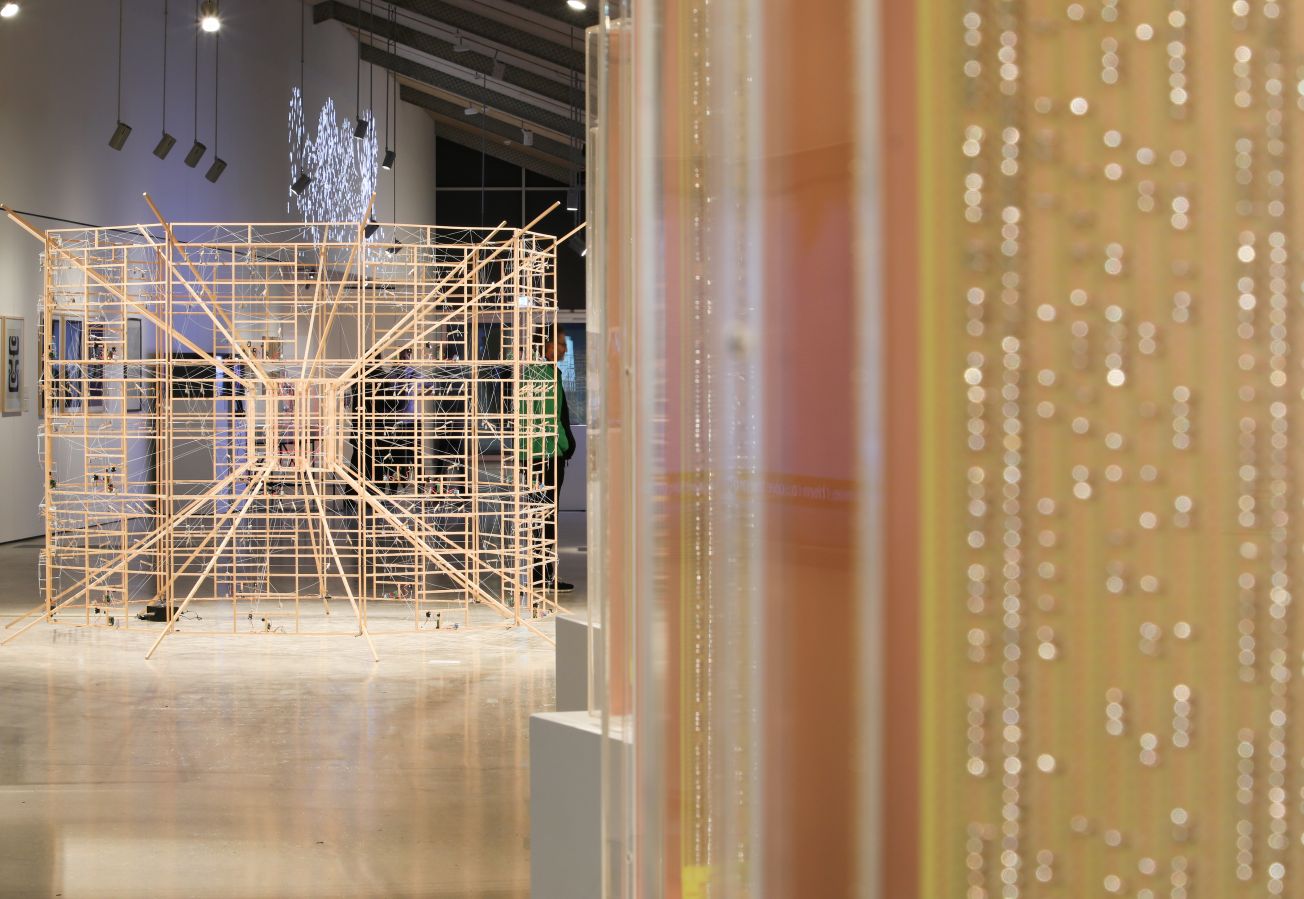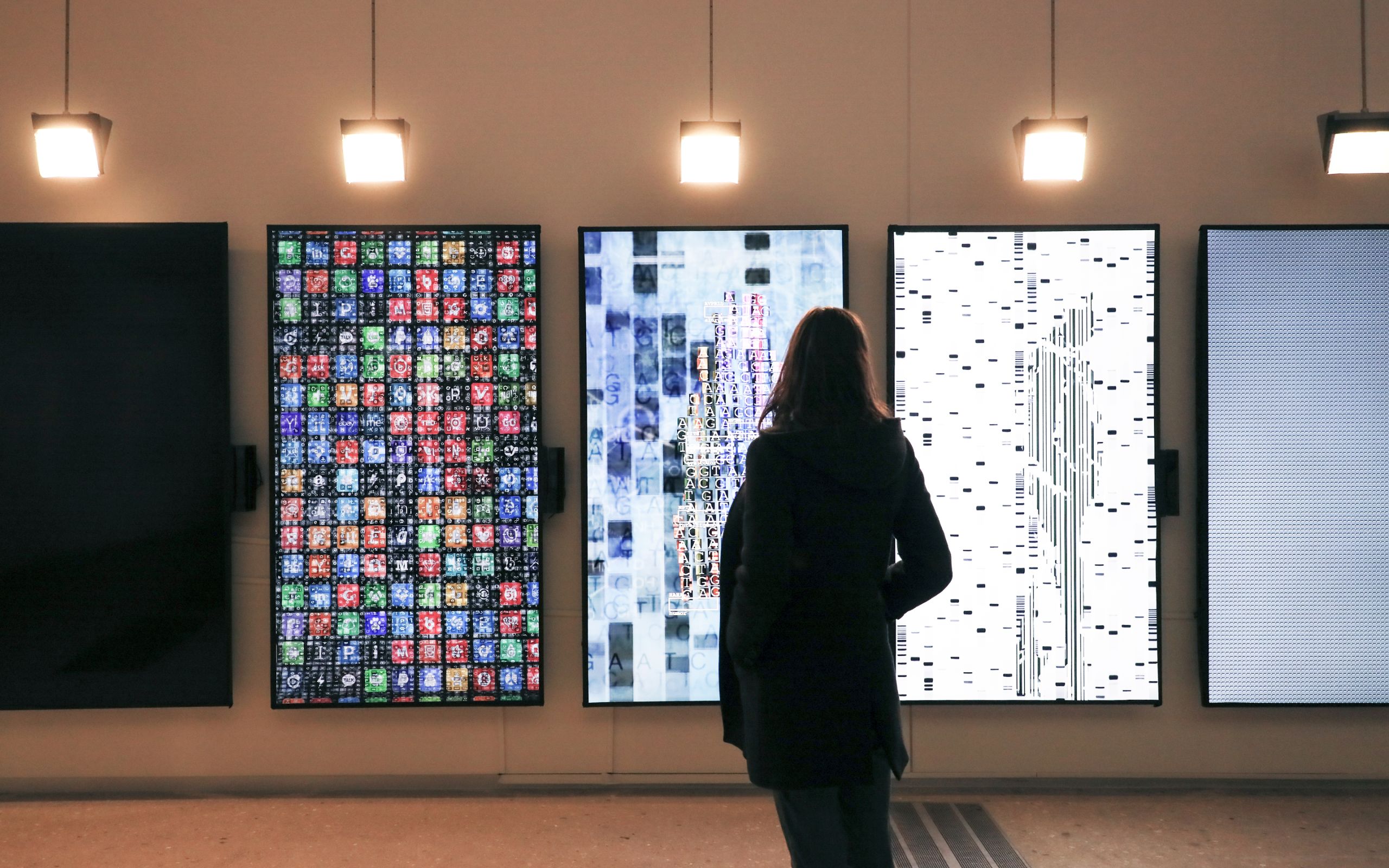Free entry
Thinking Machines. Ramon Llull and the Ars Combinatoria draws together scholarly, scientific and artistic modes of enquiry.
Through the exhibition, ArtLab rereads the late Middle Ages in the works of Ramon Llull, the outstanding Catalan philosopher and theologian, to explore the ramifications of his thinking in the realms of modern and contemporary art, and computation. The reverberations of Llullian thought on technology, art and culture find their present-day corollary in a pedagogical revolution which has ‘computational thinking’ at its core.

Márton Fernezelyi, Miklós Peternák, Zoltán Szegedy-Maszák, Combinatorial History of Images, 2017 – 2018
© EPFL - Alain Herzog


Yunchul Kim, Flare, 2014
© EPFL - Alain Herzog

Exhibition view.
Left: Ralf Baecker, Rechnender Raum / Computing Space, 2007.
Right: Philipp Goldbach, From the series Read Only Memory, 2016
© EPFL - Alain Herzog
Organized by the ZKM | Center for Art and Media Karlsruhe, in collaboration with the Centre de Cultura Contemporània de Barcelona (CCCB) and the EPFL, the exhibition proposes fresh perspectives on contemporary technologies and their development through the ages under the influence of both art and science. The exhibition offers a space in which visitors can reflect on the significance of Llullian combinatorics for generative and algorithmic principles which are now developed in advanced technologies. Thinking Machines likewise raises ethical questions on the accumulation and transfer of knowledge through intelligent systems.
A “paper computer”
The Catalan philosopher and theologian Ramon Llull (~ 1232– 1316) distilled and formalized the religious concepts of Judaism, Christianity and Islam, into an ars combinatoria, a method for generating core truths by means of a logical algebraic language. Grounded upon the medieval scholastic hypothesis that the world may have a logical structure, Llull attempted to shift the plane of signs and linguistic deductions to that of existence and mechanical argumentation. Avant la lettre, he invented a quasi-logical machine, a "paper computer", that could implement combinations of concepts mechanically.
Ramon Llull's investigations and prolific production are of profound relevance for our contemporaneity. The method Llull invented was universal in its aspiration and introduced a modern way of learning that remain pertinent today. He postulated the unity of various methods of generating knowledge, through deduction, argumentation, and dialogue. Llull, not only theoretically and linguistically invented a new technique of knowledge acquisition, like an engineer, he also mechanized it, and translated it into a machine. By combining pertinent historical documents from the archives of important libraries with modern and contemporary artistic works, the exhibition allows us to situate our current fascination with machines within a rich history of experimentation.
Contemporary artists and thinkers are in interactive dialogue with the great work of Ramon Llull. He was a nomad moving extensively across the world around the Mediterranean Sea, in the same way as his ideas were to travel, be rediscovered and echoed across time.
The exhibition brings together manuscripts and rare printed books housed within Swiss libraries, showcasing the richness of national collections, while at the same time displaying for the first time a number of previously-unknown manuscript copies of Llull's texts. These works provide visitors a rare glimpse of the original medium through which the art of combinatorics was recorded and disseminated from the Middle Ages, into the Renaissance, and through to the Enlightenment. Intricate diagrams and layered circles which, when rotated, transform into computational wheels, or paper machines and can be used by readers to generate new combinations of concepts. These designs mirror those of astronomical instruments, such as astrolabes, a number of which, in rare paper format, complete the display.
Thinking Machines is further augmented by and showcases the works of younger media artists such as Pe Lang (1974), Ralf Baecker (1977), Philipp Goldbach (1978) and Yunchul Kim (1970). In dialog with Llullian thinking, they offer current and deep insights into epistemological questions, which relate to our media environment. In addition, productions by artists such as David Link (1971), Perejaume (1957), in collaboration with CCCB for the exhibition, engage directly with Llull’s ideas, and transpose them into today’s social topicality. Bernd Lintermann (1967) in the installation YOU:R:CODE, originally conceived for the ZKM I Karlsruhe, examines digital transformations of the self, pivoting of the dualities of ‘your code’ and ‘you are code’ in which genetic code forms the algorithm of life. These works, operating on the basis of immersion and interaction, open novel approaches to Llull, providing visitors new understandings of their own ways of thinking and perception.
The exhibition is organized by the ZKM | Center for Art and Media Karlsruhe, in collaboration with the Centre de Cultura Contemporània de Barcelona – CCCB and EPFL | École polytechnique fédérale de Lausanne. Thinking Machines has been imagined by Amador Vega (Pompeu Fabra University, Barcelona), Peter Weibel (ZKM | Karlsruhe) and Siegfried Zielinski (UdK, Berlin University of the Arts). It has been developed under the supervision of ArtLab Director Sarah Kenderdine for its Lausanne stage.
Participating artists and thinkers
Abraham Abulafia, Petrus Apianus, Ralf Baecker, Manuel Barbadillo, Berlin Society for Nontrivial Pursuits (S4NTP), Michael Bielicky, Hélène Binet, John Cage, Juan Eduardo Cirlot, Salvador Dalí, Márton Fernezelyi, Philipp Goldbach, Matthias Gommel, Jean-Jacques Grandville, Sabine Groschup, Philipp Matthäus Hahn, Daniel Irrgang, Sarah Kenderdine, Yunchul Kim, Athanasius Kircher, Alexander von Kryha, Werner Künzel, Pe Lang, Nikolaus Joachim Lehmann, Gottfried Wilhelm Leibniz, Daniel Libeskind, David Link, Bernd Lintermann, Ramon Llull, Christian Lölkes, Josep Maria Mestres Quadreny, Stephan Michelspacher, Manfred Mohr, Thomas Le Myésier, Valère Novarina, José Pal Latorre, Perejaume, Miklós Peternák, Giovanni Battista della Porta, Robert Preusse, Francesc Pujols, Raymond Queneau, Stefanie Rau, Sophie Reiser, Kamila B. Richter, Petrus Roselli, Arnold Schönberg, Jeffrey Shaw, Adam Słowik, Josep Soler, Josep Maria Subirachs, Zoltán Szegedy-Maszák, Edwin Thumboo, Philipp Tögel, Tatjana Joëlle van Vark, Amador Vega, Peter Weibel, Iannis Xenakis, José María Yturralde, Lazarus Zetzner, Siegfried Zielinski
